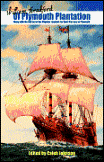Of Plymouth Plantation
by William Bradford William Bradford wrote Of Plymouth Plantation from 1630-1650, recounting the early days of the Plymouth Colony. The narrative was not published until 1865. We read it today to gain insight about the early days of our nation, and to learn about Puritan Plain Style, Bradford's style of writing. This narrative is a good resource to discuss when studying American history and Thanksgiving. |
Reading Activities
Relevant Documents
Related Texts
Reading Activities
Help Wanted: Leader
Have students write a classified ad seeking a governor for the Pilgrims, a person who can lead people in the most adverse situations. After students read Of Plymouth Plantation, ask them how they would change the job description.
Would your students want such a job? Do they think Bradford knew what he was getting into? Why would he have risked leading over 100 people to the unknown shores of North America?
Find a number of sources on William Bradford, from encyclopedias to textbooks to Websites, preferably with different perspectives. Get students into groups, giving each group one reference. Ask the groups to read the reference and then answer the following questions. Encourage students to find quotes from the texts to support their answers.
- How is Bradford portrayed in this reference?
- What kind of man do you think William Bradford was?
- Do you think Bradford was successful? Why or why not?
Here is brief biography of Bradford:
William Bradford (1590-1657) was elected governor of the Plymouth Colony after the death of the previous governor, John Carver. Born in Yorkshire, England, Bradford joined a group of Puritan extremists, who called themselves Separatists, and moved to Holland with them to escape religious persecution in England. In 1620, Bradford and others boarded the Mayflower with the intent to settle in Virginia. Bradford maintained friendly relations with area natives because the Pilgrims could not have survived without their help. But certainly the customs and beliefs of the Pilgrims and the Wampanoag differed.The Pilgrims indebted themselves to a group of Englishmen known as "merchant adventurers." The "merchant adventurers" agreed to risk their money, and the Pilgrims agreed to invest their personal labor for seven years. Bradford insisted that the Pilgrims meet their obligations to the investors, and in 1627, he and seven others bought out the merchants. Although more lenient than others about varying religious beliefs, he was responsible for keeping Plymouth independent of the Massachusetts Bay colony. He wrote Of Plymouth Plantation over a twenty-year period, 1630-1650, but it was not published in its entirety until 1865. Of Plymouth Plantation was written in Puritan Plain Style which accounts for its simple language.
What Do You Think of Pilgrims? Before and After Reading Posters
Poster 1: Prior to reading of Plymouth Plantation, on the top of a large piece of butcher paper write "Before Reading" and "After Reading," with a line down the center of the paper. Give students 3-5 minutes to write down everything they think they know about Pilgrims, and early Plymouth. After they are done, make a list of their ideas below the heading "Before Reading." Display the poster in your classroom. After they have read Of Plymouth Plantation, students will generate another list, refuting or agreeing with their original notions about Pilgrims. That information will be written below the heading "After Reading."
Poster 2: On the top of a large piece of butcher paper write "Before Reading" and "After Reading," with a line down the center of the paper. Give students 3-5 minutes to write a description of the journey the Pilgrims took to the New World. What did the Pilgrims eat? How did they pass time on the ship? What was the journey itself like? Have any of the students been in a small vessel in open seas? After they have read Of Plymouth Plantation, students will generate another list, refuting or agreeing with their original notions about Pilgrims' journey. That information will be written below the heading "After Reading."
Keep posters up in your classroom for the entire time you are reading Of Plymouth Plantation.
Modes of Discourse
Prose is often considered to have four types of discourse: narration, description, exposition, and persuasion. Most prose writers use all four modes.
- Narration—a statement of events, especially in chronological order, that tells a story.
- Description—a telling of a tale that speaks to the five senses, creating pictures with words.
- Exposition—writing that is primarily intended to convey information, to explain, or to give instruction.
- Persuasion—writing that is meant to convince readers that a certain opinion is correct.





